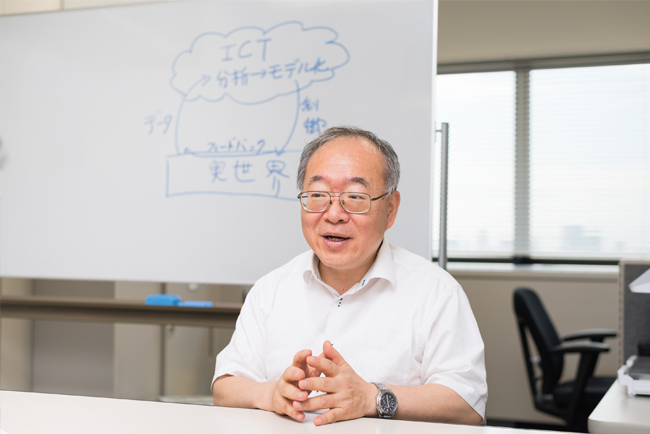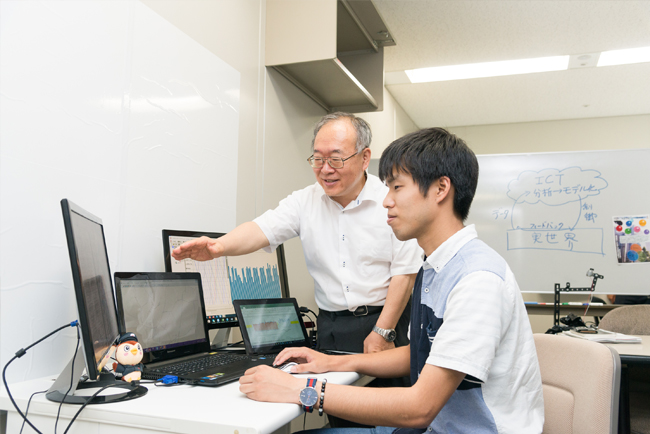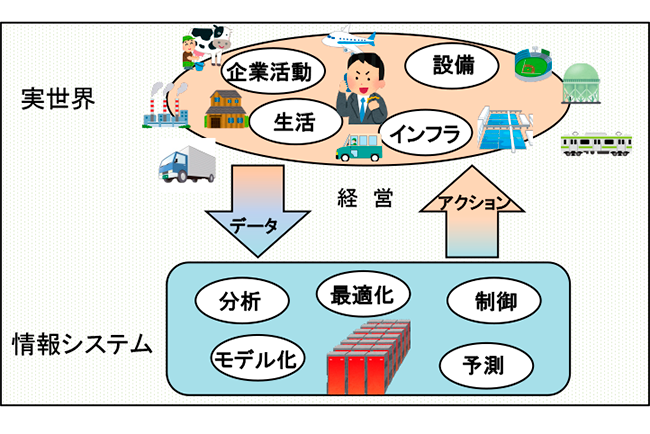In April 2016, Kogakuin University reorganized the Faculty of Informatics.In addition to the conventional computer science department and information design department, a new system mathematics department and information and communication engineering department have been established.By organizing a total of four departments, a curriculum that can cover a wider range of research areas in informatics has been prepared.
What kind of skills does the department aim to develop through such organizational restructuring?Behind the decision was the change in the information society called the "Fourth Industrial Revolution (Industrie 4.0)", which has been progressing rapidly in recent years in various countries around the world, and the accompanying change in the demand for technology and human resources.
Towards a society where all industries are connected
"The Fourth Industrial Revolution is simply a situation in which all industries are connected vertically and horizontally in society and are closely linked. Corporate management, sites, stores, customers, everything. The idea is to provide better products and services in a more efficient manner without wasting resources, labor and energy by connecting them. However, detailed efforts vary slightly from country to country. "Professor Yoshio Miki, Dean of the Department of Systems and Mathematics of the same department.
In Germany, the efforts of a kitchen furniture maker called Nobilia are taken up as a concrete example of Industrie 4.0.The company has introduced an ID assignment to furniture parts and an automatic production system using robots, and completely manages the process from ordering to material procurement, processing, assembly, and shipping.We realize the manufacture and sale of custom-made products in a short period of time and at low prices.In Germany, there seems to be a momentum to promote such a fourth industrial revolution initiative nationwide.
In the United States, General Electric proposes optimization of maintenance timing and improvement of product usage by attaching sensors to aircraft engines manufactured in-house to constantly monitor the operating status and grasp data, and users can use it. We are trying to help reduce costs.Professor Miki says that these movements are characterized by being practiced mainly by large corporations in the United States.

On the other hand, even in Japan, research is underway to utilize the enormous amount of data accumulated in companies and society, mainly in the industrial world.By using such big data and artificial intelligence technology, we can sense various phenomena in society, create mathematical models, and predict the near future of society as a whole at the speed of a computer so that humans can not think. It is also possible to propose various actions.In other words, not only is the efficiency improved by using computers, but the real world and the computer world work together to realize a form in which society as a whole is optimized autonomously.
In order to develop human resources who can respond to such changes in society, the Faculty of Informatics of Kogakuin University provides unique guidance that goes beyond the conventional framework of informatics.In the Department of Systems Mathematical Sciences, which Professor Miki teaches, students are provided with opportunities for economic education and project participation with companies and communities, experience the movements of the real world, build mathematical models from the data obtained there, and further. We are working on education on building an ICT system to process them.Professor Miki says that by acquiring these skills, he will acquire the ability not only to build information systems for companies and society by himself, but also to plan management, marketing, and corporate information strategies in the future.

Coordination between a computer and a human like a three-legged race
As a concrete example of research in Professor Miki's laboratory, there is research on the use of route buses.The number of route bus users in Japan continues to decline as a result, but with the declining birthrate and aging society continuing to progress, questionnaire surveys in various cities, towns and villages show that future demand for route buses Seems to be on the rise.In order for the route bus operating company to accurately respond to future increases in demand, it is essential to analyze the bus usage status from the data and implement various business improvements.
According to Professor Miki, the route bus accurately reflects the behavior of local residents as a running sensor.When we made a prediction model of the number of passengers getting on and off based on the census and weather information, it is possible to predict how many people will get on and off the bus on that day with high accuracy so that the error per bus is only 0.5 people. became.Professor Miki says that by applying such a model, it can be used not only for optimizing bus routes and operation plans, but also for simulation when considering new bus routes.

"Some people think that as the level of computers, network environments, and artificial intelligence rises, humans will be overtaken and lose their existence value, but I think society is society. As mentioned above, I think that human beings are the center of it. If human beings have the values to move in the right direction by themselves, the computer will suggest the answer that suits them. I hope we can create a society where humans can work together like a tripod and move in a better direction with nature. "
A society in which humans and technology can work together like a three-legged race to lead a sustainable life in the future.It is expected that a large number of human resources who can create the solutions and systems necessary to realize such a future will leave the Faculty of Informatics of Kogakuin University.


